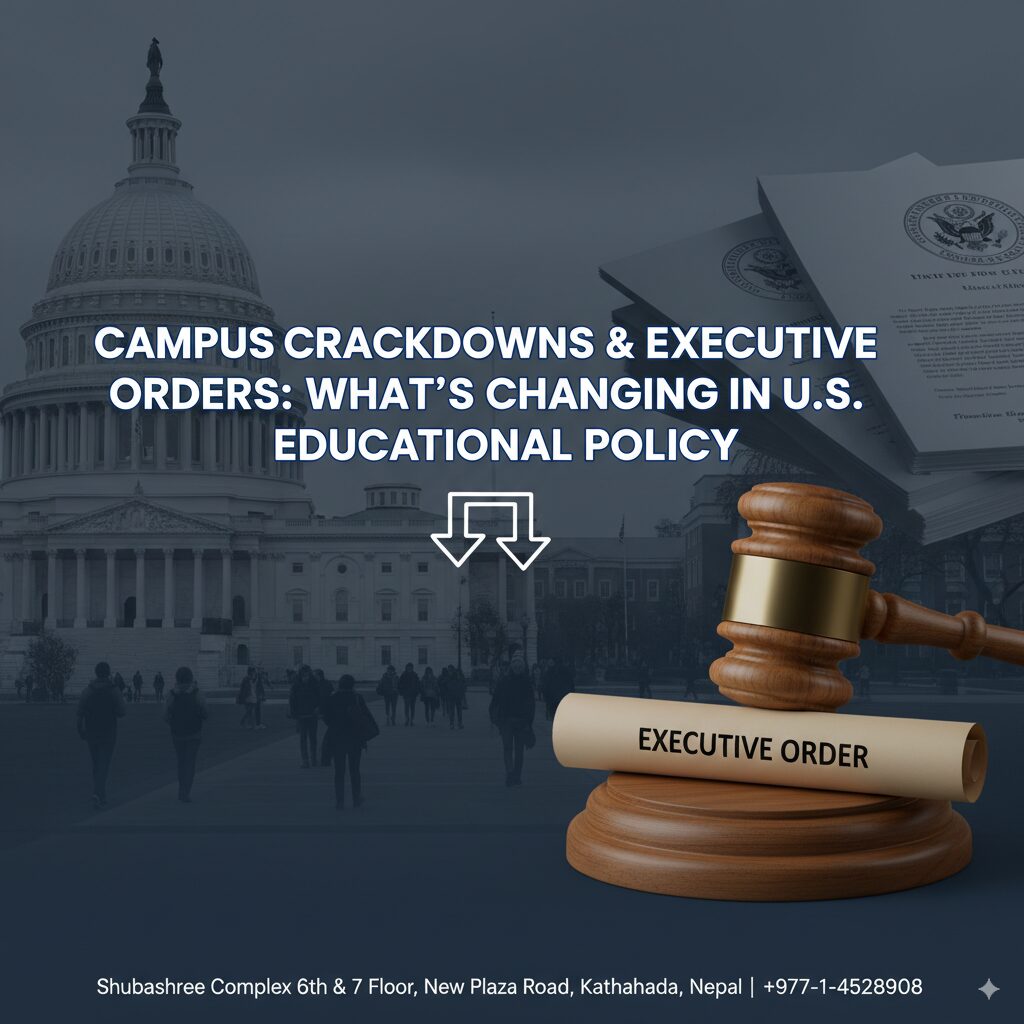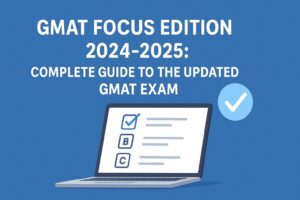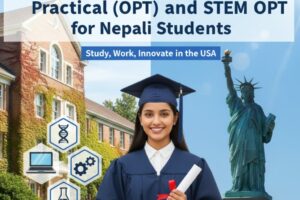Campus Crackdowns & Executive Orders: What’s Changing in U.S. Educational Policy

For many Nepalese students, pursuing higher education in the U.S. has long been a dream, offering unparalleled academic and professional pathways. However, in 2025, a new wave of U.S. immigration and educational policies is fundamentally altering that journey. From visa interviews and work authorization to the very duration of a student’s stay, these shifts are creating a more complex and demanding environment. Understanding these changes is not just a recommendation—it’s essential for a successful and uninterrupted academic and career trajectory.
Here’s a breakdown of the key policies and their implications, particularly for students from Nepal.
What’s Changing: Key Proposed & Implemented Policies
1. Proposed Rule to End “Duration of Status” (D/S)
- The Shift: The Department of Homeland Security (DHS) has published a Notice of Proposed Rulemaking to replace the “Duration of Status” (D/S) system for F-1 (students) and J-1 (exchange visitors) visa holders.
- The New System: If finalized, students would be admitted for a fixed period—not to exceed four years—plus a shorter grace period. This is a dramatic departure from the current system, where students can remain in the U.S. as long as they are making normal academic progress.
- Extensions: Program extensions (for additional degrees, transfers, or post-completion training) would require a formal “Extension of Stay” application (Form I-539) with U.S. Citizenship and Immigration Services (USCIS), a process that adds bureaucracy and potential for delays.
- Grace Period: The grace period for F-1 students after completing their studies would be halved, from 60 days to just 30 days.
Current Status: This is a proposed rule, not yet law. The public comment period is open through late September 2025. Revisions are possible based on feedback from the public and educational institutions.
2. Visa Interview Waiver Policy Changes
- The Shift: Effective September 2, 2025, the U.S. Department of State is largely eliminating the interview waiver program for many visa applicants, including F-1 and J-1 students.
- The New Requirement: Most nonimmigrant visa applicants, even for renewals, will now be required to appear for an in-person interview at a U.S. consulate or embassy. This ends the “drop-box” renewal process that many students from Nepal have used in the past.
- Impact: This policy will almost certainly increase visa appointment wait times and add a new layer of complexity to the application and renewal process.
3. Expanded Vetting and Social Media Screening
- The Shift: The State Department has implemented updated guidance that includes enhanced screening and vetting of visa applicants’ online presence.
- The New Requirement: Consular officers are now instructed to conduct a “comprehensive and thorough vetting” of all student and exchange visitor applicants’ online activity, including social media profiles. In some cases, applicants may be “instructed” to make their privacy settings public to facilitate this review.
- Temporary Pause: This new policy was preceded by a temporary global pause on new F, J, and M visa interview appointments in late May 2025, as U.S. embassies prepared to roll out these new, more rigorous vetting rules.
4. End of Visa “Shopping”: Apply Only in Your Country of Residence or Nationality
- Effective November 1, 2025, the U.S. Department of State will require all visa applicants to apply either in their country of nationality or in their country of residence.
- Impact for Nepali Students: This means Nepalese applicants can no longer book F-1 visa interviews in India, Singapore, or other third countries to avoid wait times. The U.S. Embassy in Kathmandu will now be the primary—and in most cases, only—option.
- Consequence: Expect higher demand, longer wait times, and limited flexibility. Students must plan interview dates months in advance.
What This Means for Nepalese Students
These policy changes are not just procedural; they have tangible consequences for your academic plans and career aspirations.
- Increased Uncertainty & Risk: The combination of fixed-term visas and stricter vetting means that any academic, administrative, or visa-related delay could have serious implications for your legal status. The margin for error is shrinking.
- Costs & Delays: More frequent USCIS filings for extensions, coupled with longer wait times for visa interviews at the U.S. Embassy in Kathmandu, can add both financial costs and significant delays to your plans.
- Impact on Career & Work Trajectories: While OPT/CPT (Optional/Curricular Practical Training) haven’t been eliminated, the proposed fixed-term admission rules could make the process of securing and extending work authorization more complex and demanding.
Strategic Recommendations & Best Practices
To navigate this new environment, students from Nepal must be proactive and meticulous.
- Plan Early for Visa Interviews: With the end of most interview waivers, it is critical to schedule your visa appointment well in advance. The U.S. Embassy in Kathmandu is likely to experience increased demand and longer backlogs.
- Maintain Flawless Status & Compliance: Under the proposed fixed-period system, staying in compliance with your school’s rules and SEVIS reporting obligations becomes even more vital. Any lapse in status could trigger a need for a complicated reinstatement process with USCIS.
- Prepare for Additional Paperwork: Anticipate a more demanding process for all immigration-related filings, especially for OPT/STEM OPT. File applications as early as possible and stay in close communication with your university’s international student office.
- Manage Your Online Presence: Be aware that your social media is a part of the vetting process. Review your online footprint and ensure that your posts, comments, and shared content cannot be misinterpreted in a way that could negatively impact your visa application.
- Monitor Official Announcements: Rely on official sources like the U.S. Department of State, USCIS, and your university’s international student office for the most accurate information. Avoid rumors and misinformation.
Conclusion: Stay Vigilant, Stay Prepared
The U.S. is clearly moving toward a more regulated and controlled system for international students. For Nepalese students, this means the path to a U.S. degree and subsequent work experience requires greater foresight and diligence than ever before. Don’t assume that past rules will apply. Instead, stay informed, strategize your timeline meticulously, and prepare for a more demanding application process. Your ability to adapt and plan will be the key to your success.
Edwise Foundation is committed to helping Nepalese students navigate these challenges with expert guidance, updated information, and personalized counseling—ensuring your U.S. academic journey stays on track.


